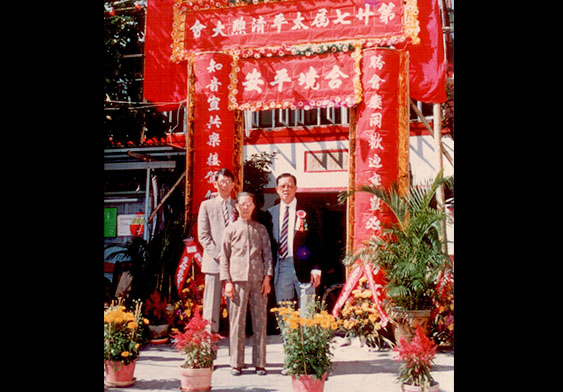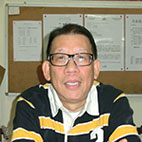
Ng Siu Kei and his mother pictured with the Village Headman
Ng Siu Kei and his mother pictured with Lee Foo, the then Village Headman, in front of the gatehouse during the Jiao Festival of 1986-Provided by Ng Chi Wing
Ng Siu Kei and his mother pictured with the Village Headman
Ng Siu Kei and his mother pictured with Lee Foo, the then Village Headman, in front of the gatehouse during the Jiao Festival of 1986-Provided by Ng Chi Wing
Ng Siu Kei’s mother
A native of Shek Lung, Ng Siu Kei’s mother got married to his father in Nga Tsin Wai after they were brought together by a match maker. He feels that his mother was a stubborn and hard-working woman who did well to adjust to married life in a traditional walled village. Ng Siu Kei’s father made his living during the 1950s and 1960s as a seafarer. While he was away at sea, his wife had to play the role of both father and mother. During the time of water rationing, this meant she had to go and fetch the family’s supplies from the public taps outside the village. Ng Siu Kei’s mother had a habit of squirreling away bank notes in dark corners of her home in order to prevent her kids and grandkids from finding and spending them. When their mother passed away in 1990, Ng Siu Kei and his siblings went back to the old residence to clear the place up. They found several thousand dollars in the gap of a nylon chair plus various other bank notes either rolled up inside or wrapped around paper napkins!
His mother was not sociable in the village and only cared about her own family’s business. That said, when it came to Tin Hau Festival or Jiao Festival, she would happily offer to help her neighbours with their work. In the Jiao Festival of Nga Tsin Wai in 1976, she even played the role of a ‘blessed woman’ and went into Tin Hau Temple to take the Tin Hau outside. Traditionally, only female villagers recognised as being blessed women with husbands, children and grandchildren were entitled to play such a role.


 BACK
BACK  CLOSE
CLOSE 